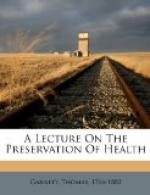’-----All combin’d ’and ruled unerring, by that single power ‘which draws the stone projected, to the ground.’
In the animated part of the creation, we observe those beautiful phenomena which are exhibited by an almost infinite variety of individuals, all depending upon one simple law, the action of the exciting powers on the excitability.
I cannot express my admiration of the wisdom of the creator better than in the words of Thomson.
’O unprofuse magnificence divine! ’O wisdom truly perfect! thus to call ’from a few causes, such a scheme of things; ‘effects so various, beautiful, and great.’
Life then, or those functions which we call living, are the effects of certain exciting powers, acting on the excitability, or property distinguishing living from dead matter. When those effects, namely, the functions, flow easily, pleasantly, and completely, from the action of the exciting powers, they indicate that state which we call Health.
I have detained you a long time on this subject, but it is of importance to make you acquainted with these laws; for it is from a knowledge of them, that the rules for preserving health must be deduced; and having rendered them, as I hope, intelligible to you, I shall proceed to point out such necessary cautions for your conduct, as are easily deduced from them; and which experience confirms; and I shall follow an arrangement in the consideration of the subject, which naturally presents itself to us. The chief exciting powers which act upon us are, air and food; these I shall respectively consider, and afterwards make a few remarks on exercise.
The air is the main-spring in the animal machine; the source of heat and activity, without which our blood would soon become a black and stagnant mass, and life would soon stop.
It is now known, that only a part of atmospheric air, is necessary for respiration: the atmosphere near the surface of the earth, consists of two kinds of air; one, which is highly proper for respiration, and combustion, and in which, an animal immersed, will live much longer than in the same quantity of common air; and one, which is perfectly improper for supporting respiration, or combustion, for an instant.
The first of these airs, has been called vital air, from its property of supporting life, and constitutes about one fourth of the atmosphere. [3] The other, from its property of destroying life, is called azote, and forms of course the remaining three fourths of the atmosphere.
These two airs may be separated from each other by various methods. If a candle be inclosed in a given quantity of atmospheric air, it will burn only for a certain time, and then be extinguished; and from the rising of the water in the vessel in which it is inclosed, it is evident that a quantity of air has been absorbed. What has been absorbed is the vital air, and what remains, the azote, which is incapable of supporting flame. If an animal be immersed in a given quantity of common air, it will live only a certain time; at the end of this time, the air will be found diminished, about one fourth being extracted from it, and the remainder will neither support flame nor animal life; this experiment might easily be made, but it seems a piece of unnecessary cruelty.




